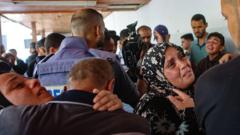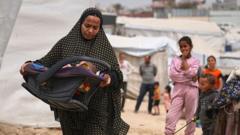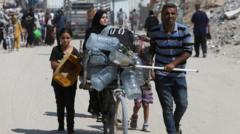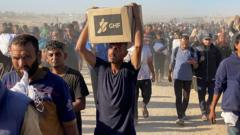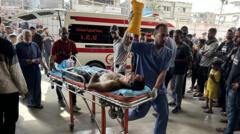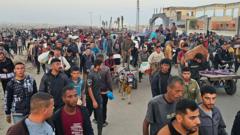The humanitarian situation in Gaza continues to deteriorate with pregnant women facing life-threatening conditions due to food shortages, blockades, and access to medical care. Reports indicate an alarming rise in low birth weights, complications during birth, and a lack of essential healthcare resources, highlighting the desperate plight of mothers and infants in the region.
Healthcare Crisis for Pregnant Women and Newborns Amid Gaza's Warfare
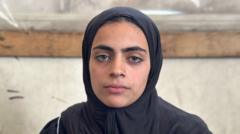
Healthcare Crisis for Pregnant Women and Newborns Amid Gaza's Warfare
The ongoing conflict in Gaza has severely impacted pregnant women and newborns, leading to heightened risks during pregnancy and childbirth as supplies dwindle.
Article text:
In the ongoing violence of the Gaza conflict, expectant mothers and newborns are suffering gravely due to the dire humanitarian conditions. Currently, more than 55,000 pregnant women find themselves in peril as significant shortages of food and medical supplies plague the territory. The United Nations reports that one in ten newborns is either underweight or born prematurely, while instances of miscarriages and stillbirths are on the rise.
At Nasser Hospital in Khan Younis, Malak Brees, a mother-to-be, is filled with dread over the possibility of premature birth due to the impact of constant bombings and evacuation orders. "The doctors said my condition was a result of malnutrition," she shared with deep concern over her baby's well-being.
The healthcare system has been severely crippled since Israel imposed a total blockade on Gaza, which they claim is aimed at combating Hamas. Basic medical supplies are running out as military action disrupts typical healthcare services. Women have reported giving birth in makeshift shelters due to their inability to access hospitals, while those who manage to reach medical facilities face alarming discharge practices, often returned home far too soon.
As Nasser Hospital grapples with an influx of patients following attacks that incapacitated the nearby European Hospital, healthcare workers are overwhelmed. Many babies requiring intensive care are being sent home due to a lack of capacity, increasing the likelihood of adverse health outcomes.
The stress on expectant mothers in Gaza influences their ability to care for their newborns. Dr. Ahmad al-Farra highlights the psychological toll of uncertain conditions, where mothers fret over inadequate nutrition and insufficient healthcare monitoring during pregnancy.
Aya al-Skafi stands as a representative of heartbreak within this crisis. After her daughter passed away from malnutrition, Aya's lamentations echo the desperation faced by many mothers in the region as they struggle against the backdrop of war, fighting to secure basic necessities for their children's survival.
Nursing and lactation experts are attempting to alleviate these challenges. Despite many mothers' health impairments, initiatives are underway to support breastfeeding practices, highlighting that formula dependence could exacerbate health issues amidst the ongoing shortages.
The devastating impacts of war continue to unfold, with tragic narratives emerging daily. Women like Jomana Arafa, who recently welcomed twins, tragically lost them to a missile strike just days later, exemplifying the heartbreak mothers endure in this ravaged land.
With each passing day, the scope of the crisis surrounding pregnancy and childbirth in Gaza becomes increasingly urgent. What once symbolized hope and new beginnings now symbolizes struggle amid the chaos of war, underscoring the humanitarian disaster that has gripped the region.
In the ongoing violence of the Gaza conflict, expectant mothers and newborns are suffering gravely due to the dire humanitarian conditions. Currently, more than 55,000 pregnant women find themselves in peril as significant shortages of food and medical supplies plague the territory. The United Nations reports that one in ten newborns is either underweight or born prematurely, while instances of miscarriages and stillbirths are on the rise.
At Nasser Hospital in Khan Younis, Malak Brees, a mother-to-be, is filled with dread over the possibility of premature birth due to the impact of constant bombings and evacuation orders. "The doctors said my condition was a result of malnutrition," she shared with deep concern over her baby's well-being.
The healthcare system has been severely crippled since Israel imposed a total blockade on Gaza, which they claim is aimed at combating Hamas. Basic medical supplies are running out as military action disrupts typical healthcare services. Women have reported giving birth in makeshift shelters due to their inability to access hospitals, while those who manage to reach medical facilities face alarming discharge practices, often returned home far too soon.
As Nasser Hospital grapples with an influx of patients following attacks that incapacitated the nearby European Hospital, healthcare workers are overwhelmed. Many babies requiring intensive care are being sent home due to a lack of capacity, increasing the likelihood of adverse health outcomes.
The stress on expectant mothers in Gaza influences their ability to care for their newborns. Dr. Ahmad al-Farra highlights the psychological toll of uncertain conditions, where mothers fret over inadequate nutrition and insufficient healthcare monitoring during pregnancy.
Aya al-Skafi stands as a representative of heartbreak within this crisis. After her daughter passed away from malnutrition, Aya's lamentations echo the desperation faced by many mothers in the region as they struggle against the backdrop of war, fighting to secure basic necessities for their children's survival.
Nursing and lactation experts are attempting to alleviate these challenges. Despite many mothers' health impairments, initiatives are underway to support breastfeeding practices, highlighting that formula dependence could exacerbate health issues amidst the ongoing shortages.
The devastating impacts of war continue to unfold, with tragic narratives emerging daily. Women like Jomana Arafa, who recently welcomed twins, tragically lost them to a missile strike just days later, exemplifying the heartbreak mothers endure in this ravaged land.
With each passing day, the scope of the crisis surrounding pregnancy and childbirth in Gaza becomes increasingly urgent. What once symbolized hope and new beginnings now symbolizes struggle amid the chaos of war, underscoring the humanitarian disaster that has gripped the region.


